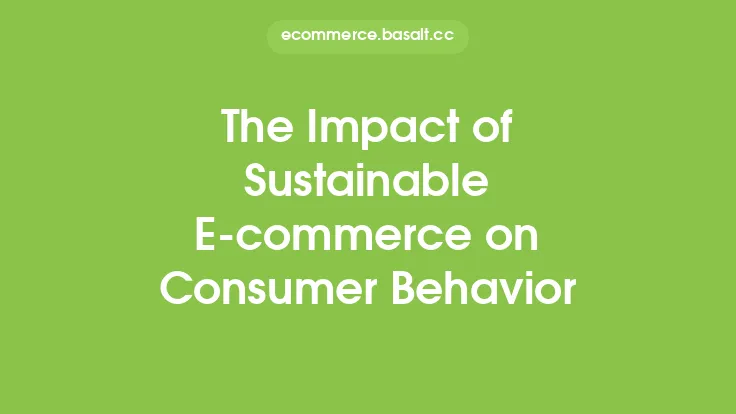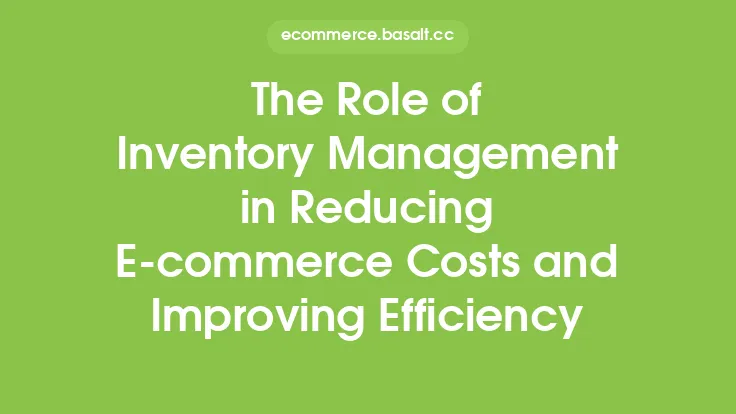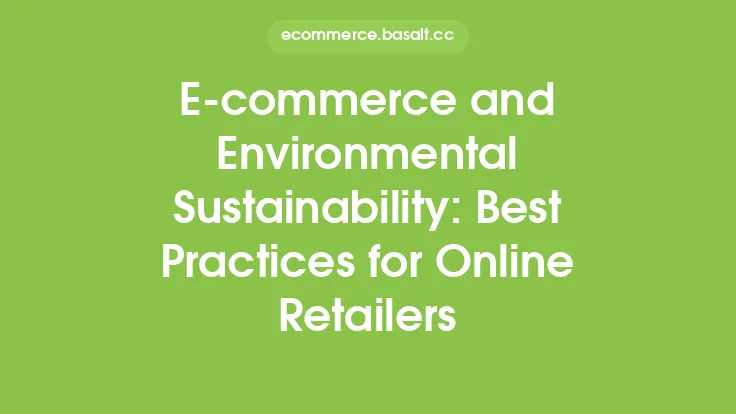As the world becomes increasingly digital, the e-commerce industry has experienced rapid growth, with more and more consumers turning to online shopping for convenience and flexibility. However, this growth has also led to a significant increase in energy consumption, with data centers, servers, and transportation networks all requiring large amounts of power to operate. This has resulted in a substantial carbon footprint, contributing to climate change and environmental degradation. Therefore, it is essential for e-commerce companies to prioritize energy efficiency and renewable energy to reduce their environmental impact and promote sustainability.
Energy Efficiency in E-commerce
Energy efficiency is critical in e-commerce, as it can help reduce energy consumption, lower costs, and minimize the carbon footprint of online retail operations. There are several ways to achieve energy efficiency in e-commerce, including optimizing data center operations, using energy-efficient servers and equipment, and implementing smart building technologies. For example, companies can use virtualization and cloud computing to reduce the number of physical servers needed, which can lead to significant energy savings. Additionally, e-commerce companies can invest in energy-efficient lighting and HVAC systems, which can also help reduce energy consumption.
Renewable Energy in E-commerce
Renewable energy is another crucial aspect of sustainable e-commerce, as it can help reduce dependence on fossil fuels and lower greenhouse gas emissions. E-commerce companies can invest in on-site renewable energy systems, such as solar or wind power, to generate electricity and reduce their reliance on the grid. Alternatively, companies can purchase renewable energy credits (RECs) or invest in off-site renewable energy projects, such as wind farms or solar arrays, to offset their energy consumption. Renewable energy can also be used to power transportation networks, such as electric or hybrid vehicles, which can help reduce emissions and promote sustainability.
Benefits of Energy Efficiency and Renewable Energy in E-commerce
The benefits of energy efficiency and renewable energy in e-commerce are numerous. For example, reducing energy consumption can lead to significant cost savings, which can be reinvested in the business or used to improve customer experience. Additionally, promoting sustainability and reducing environmental impact can enhance a company's reputation and appeal to environmentally conscious consumers. Energy efficiency and renewable energy can also help e-commerce companies comply with regulations and standards, such as the European Union's Energy Efficiency Directive, which requires companies to reduce their energy consumption and greenhouse gas emissions.
Implementing Energy Efficiency and Renewable Energy in E-commerce
Implementing energy efficiency and renewable energy in e-commerce requires a comprehensive approach that involves multiple stakeholders and departments. E-commerce companies can start by conducting an energy audit to identify areas of inefficiency and opportunities for improvement. They can then develop a sustainability strategy that outlines goals and objectives for reducing energy consumption and promoting renewable energy. Companies can also invest in energy-efficient technologies and equipment, such as LED lighting and energy-efficient servers, and implement smart building technologies to optimize energy use. Additionally, e-commerce companies can partner with renewable energy providers or invest in on-site renewable energy systems to reduce their dependence on fossil fuels.
Best Practices for Energy Efficiency and Renewable Energy in E-commerce
There are several best practices that e-commerce companies can follow to promote energy efficiency and renewable energy. For example, companies can prioritize energy-efficient design and operations, such as using natural light and optimizing HVAC systems. They can also invest in energy-efficient equipment and technologies, such as energy-efficient servers and data storage systems. Additionally, e-commerce companies can promote sustainable transportation practices, such as using electric or hybrid vehicles, and encourage employees to use public transportation or carpool. Companies can also engage with stakeholders, including customers, employees, and suppliers, to promote sustainability and reduce environmental impact.
Conclusion
In conclusion, energy efficiency and renewable energy are essential components of sustainable e-commerce, as they can help reduce energy consumption, lower costs, and minimize environmental impact. E-commerce companies can prioritize energy efficiency by optimizing data center operations, using energy-efficient equipment and technologies, and implementing smart building technologies. They can also invest in renewable energy systems, such as solar or wind power, to reduce their dependence on fossil fuels and promote sustainability. By following best practices and implementing energy efficiency and renewable energy strategies, e-commerce companies can reduce their environmental impact, enhance their reputation, and promote a more sustainable future.





